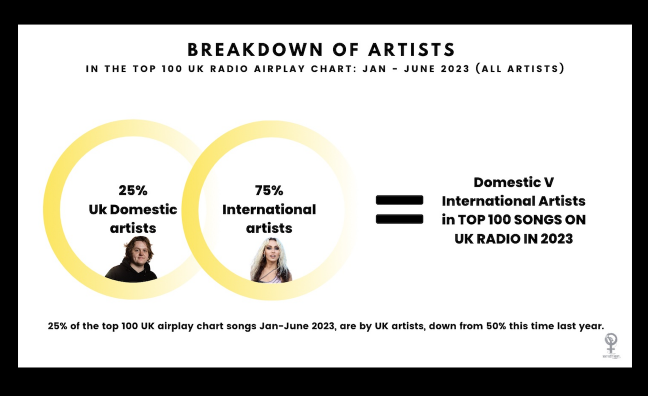The Why Not Her? Collective's 2023 UK Gender/Racial Disparity Report has revealed continuing inequality across UK radio station airplay charts.
The report analyses the Top 20 domestic British artists and bands featured across UK radio stations’ Top 20 airplay charts from June 2022 until now, as well as the Top 100 most played British and international songs in 2023 so far.
Through revealing their data, the Why Not Her? Collective aims to assist in culture change within the music business and create a more equitable and diverse landscape for the industry.
Data found from the report’s analysis of UK radio stations' Top 20 airplay charts:
White male artists still dominate on-air across commercial radio’s Top 20 airplay charts.
Commercial radio stations fall behind on shifting towards more diversified playlists. Capital, Heart, Island FM, Kiss currently only play five to 15% female acts on their heavy rotation Top 20 playlists.
BBC have shown a shift towards collaborations by mixed-gender artists over the last four years, whilst Little Simz, Arlo Parks and Raye have led a breakout of diverse female artists across the BBC.
Rock Stations Radio X, Planet Rock and Kerrang! Continue to shift towards including women in their heavy rotation playlists and move from zero to 25% female artists over the course of four years.
Data regarding the Top 100 UK and International songs of 2023 played across UK radio:
Flowers by Miley Cyrus is the No.1 song on UK Radio so far in 2023, whilst Lewis Capaldi’s Forget Me is No.1 song on UK radio by a domestic UK artist, at No.1 in the UK only artist radio charts and No.1 in the overall Top 100 radio charts.
Four percent of songs in the UK Top radio charts of 2023 – both international and domestic – are by Ed Sheeran.
Five percent of songs in the UK Top 100 international and domestic artists are by Irish male artists: Dermot Kennedy, Snow Patrol, Cian Ducrot (who has two singles in the charts) and Niall Horan.
Meanwhile, male artists are represented at 42%, whilst female and non-binary artists at 58% in the UK Top 100. Sam Smith, a non-binary artist, featured twice in the charts, both times collaborating with an artist of another gender.
In The Top 100, people of colour are represented in 29% of songs, including collaborations with white artists, whilst white artists are represented as 79% of artists.
Twenty-five percent of the Top 100 UK airplay chart songs from January to June 2023 have been by UK artists, down from 50% this time last year.
"The great news here is that we can see the consistent tangible changes across some of the biggest stations in the UK,” said Linda Coogan Byrne, lead data analyst, activist and founder of Why Not Her?. “BBC has upped its game big time and we can hear it across the Nation. BBC6Music has reached gender parity and the other key stations across the network seem to have increased in gender collaborations, bringing more diverse voices to the forefront of Uk Music Culture. It is also superb to see Rock Radio Stations that have notoriously not played women in their heavy rotation playlists in the past, shift to include women!
“On commercial radio, the station needs to examine their existing business models to ensure they can survive into the future. If they want to appeal to the 18-34 age group, one way to do that is to ensure greater diversity on the airwaves to reflect modern times. If they don’t, TikTok and other social media channels will continue to distract.
“We are delighted to see so many positive shifts across the last four years away from a homogenised male sonic landscape. It is our hope that these data reports can continue to set the precedent for a lot of change to come.
“We will continue as a collective to stand with our colleagues in working towards reaching an equal voice for women and artists of colour alongside the LGBTQIA community across every facet of our culture, and we will never be afraid to ask the question why not her/them? Change can happen at a quick rate when an unconscious bias is stripped back. We hope this report helps to make structural change."









